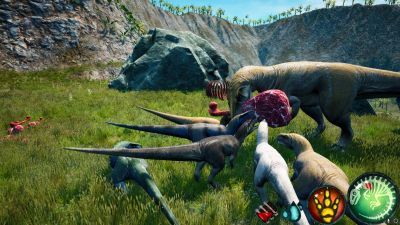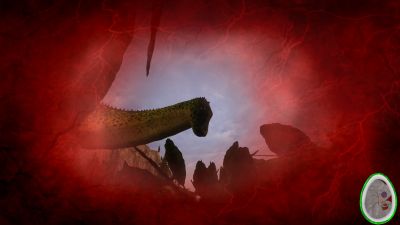Nesting
Nesting is a mechanic in Beasts of Bermuda where a pair of users can create offspring. The nesting mechanic has unique benefits for both the parents and the children.

In order to nest, there must be two mature players of the same species and opposite genders in a group together. For a creature to be considered mature, they must be 0.8+ in growth. The two given players must then mate.
To mate, they need to be within a short distance of each other, and have full ability power and stamina. If any of these conditions are not met, the game will tell you that you cannot mate.
If you succeed in mating, both players will lose their ability and lie down. The female will receive an egg HUD in the top right corner of her screen (default UI layout). The fullness of the egg icon shows how far along in gestation the egg is. During gestation, the female will receive a large drop in average comfort, and her food and water will drain quicker. These negative effects can be reduced by investing into the Good Parent talent. Once the egg is ready, the icon will appear full and receive a number on top of it. The female can mate and carry as many eggs as she'd like, and the number will change in accordance to how many are ready to be laid.

The female then can lay her egg in a nest. Nests can only be made by the male, and he must have full ability and stamina to do so. By pressing the nest key (default B), he will lose all ability power and stamina, and a nest will appear. If the ground isn’t flat enough, the male will be notified, and no nest will be created.
To lay her eggs in the nest, the female must stand over it and click the nest key. Her ready eggs will then appear in the nest. Once the egg is in the nest, it’s ready to incubate.
For an egg to incubate, a player must be inside of the given egg. Incubation takes 10 minutes, regardless of the species.
Eggs do not spawn AI dinosaurs. Instead, they spawn players. In order for a player to spawn as an egg, they must choose the egg option in creature select. Their screen will then show a list of available eggs, and the user must select the type of egg they’d like, and then choose the parents.
Once they select their desired egg, the parents will receive a notification to determine whether or not they want the given player to be their child. If they select yes, the player will then appear inside of the egg, and must wait to hatch. If they select no, the player will receive a notification that their request was denied.
The egg screen is mostly red, with an empty space in the center where the player can view their surroundings. There’s an egg icon in the bottom right corner of the screen with a yolk in it. As the user grows inside of the egg, the yolk will progressively become smaller. Eggs grow at 0.025 per tick, from 0.0 growth up to 1.0. Once at 1.0 growth as an egg, the yolk will be gone, and the player will be prompted to hatch using the ability key.
Once a player hatches, a gender will be randomly selected for them, and they will receive a random mix of their parents’ skins.
There are 2 separate perks to nesting. The parents will receive a Baby Buff from their nearby children who are below the growth of 0.7, which increases their growth speed, and the nested children will have higher chances of receiving positive inherits based around their parents’ talent trees.
Inherits are set from the moment the egg is laid based on random generation. The bigger the parents are, the better the chances of good inherits. If the mother is damaged during gestation, the eggs may receive negative effects. Laid eggs that receive damage do not affect the inherits.
The inherits that the parents have do not affect what inherits their children may get. If a parent has +2 metabolism but both parents have 0/3 points invested, the child cannot get an inherit in metabolism.
In order for a child to get a +2 inherit, they must receive a +1 in the talent from both parents. If a pair has gone 3/3 in the same talent tree, chances of +2s in the given talents are far higher than an egg from parents with 3/3 in separate talent trees.
If a player takes an egg from an incest pair, their chances of receiving positive inherits are substantially lower, and they’ll be far more likely to gain negatives instead.
Most players prefer to take eggs from parents who are at least 1.2. The bigger the parents are, the better the inherits.